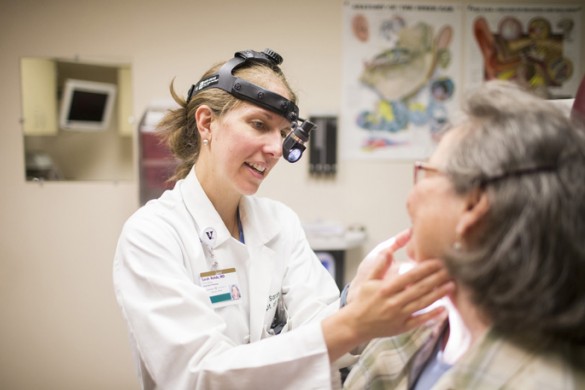
The symptoms of head and neck cancer can be subtle. To help catch the disease in its earliest stages, the Vanderbilt Department of Otolaryngology-Head and Neck Surgery and Vanderbilt-Ingram Cancer Center will offer free head and neck cancer screenings Friday, April 15, from 9 a.m. to 3 p.m.
The screening sessions will be held at the Vanderbilt Bill Wilkerson Center, Odess Head & Neck Surgery Clinic, 7209 Medical Center East–South Tower, 1215 21st Ave. S. (free parking in the East Garage off Medical Center Drive).
The annual screening and educational event is open to the public, and no appointment is necessary.
According to the National Cancer Institute, more than 100,000 Americans are diagnosed with various types of head and neck cancer every year. These cancers can occur in the nasal cavity, sinuses, throat, lips, mouth, thyroid, salivary glands or larynx (voice box).
“Lumps, bumps or sore spots on the head or neck or discomfort in the mouth and throat may be early symptoms of head and neck cancer,” said Dr. Sarah Rohde, assistant professor of otolaryngology. “It’s easy to miss these symptoms or to assume that a sore throat is just a viral infection, but if these issues continue for more than two weeks they can be a sign of something serious.”
Other symptoms include difficulty swallowing, hoarseness or a change in the voice.
Head and neck cancer has typically been associated with older patients with a history of tobacco or alcohol use, but today younger patients are developing the disease because they have been exposed to the human papilloma virus (HPV). This sexually transmitted virus is extremely common and is usually shed by the body with no long-lasting effects. In patients who remain infected with HPV, the virus can lead to head and neck cancers in men and women and cancer of the cervix among women, according to Rohde.
The free head and neck cancer screening exams take only a few minutes and are painless. During the exam, physicians inspect the mouth, tongue and throat and check the neck for abnormalities in the thyroid, lymph nodes or salivary glands.
In addition to the exams, medical professionals will be available to discuss prevention, therapy, research, supportive care and rehabilitation.
For more information, call Michelle Pham, 615-585-5388 or email michelle.pham@vanderbilt.edu.